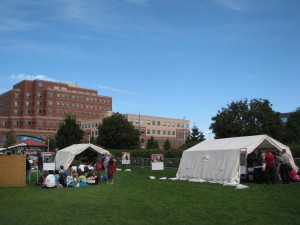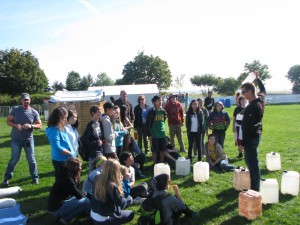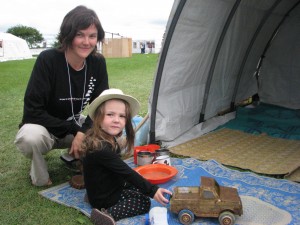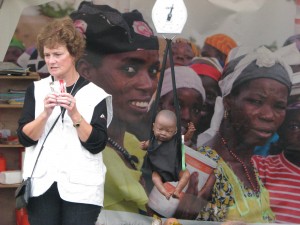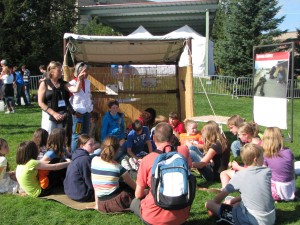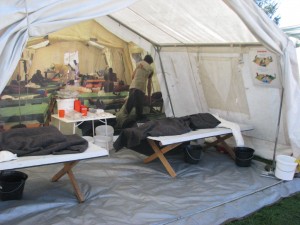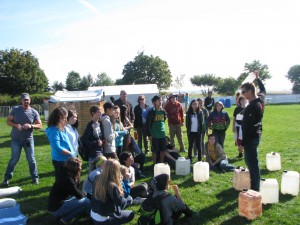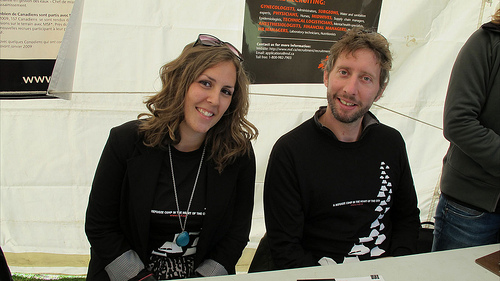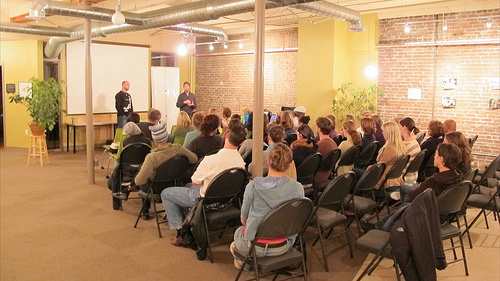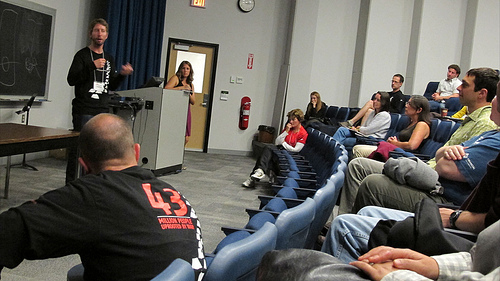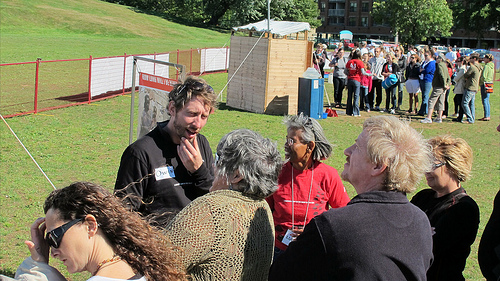Quebec City, Day 1
September 29, 2021
“We cannot force empathy”
Today, the year 1985 was often in my mind.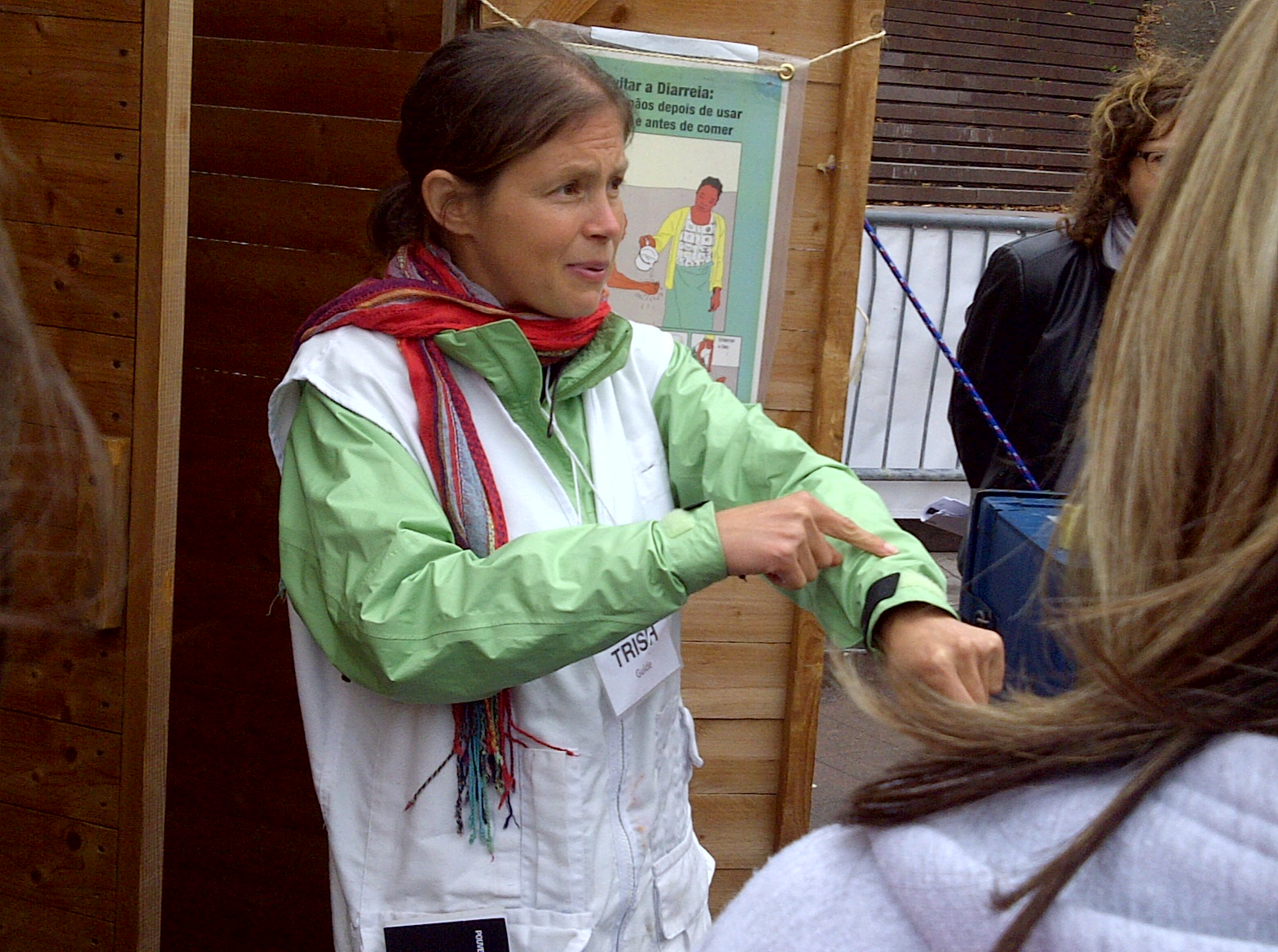
In 1985, at the age of 10 years old, I saw my first picture of a malnourished child. It was a child from Ethiopia, and it is an image that has forever haunted me. The concepts associated with the image drove me to become a nurse, and to eventually work for Médecins Sans Frontières / Doctors Without Borders.
Today as I toured school groups through the refugee camp, the shocked looks on students’ faces brought back to life my 1985 memories. For some the camp brings up subjects they may have never confronted before. Understandably, this can be challenging.
A student on one of my tours cried in the malnutrition station today. I left her to cry, because malnutrition is hard to comprehend. It is an injustice. Death to malnutrition is unpardonable. I often wish that the situation of malnutrition in this world made more people cry, and made more people act. I wanted to congratulate and thank her for crying, to thank her for her empathy.
At one point in the day I headed into the streets to encourage people to come to the exhibit. I met some tourists who clearly told me that they were in Quebec City to visit the city not to hear about the problems of the world.
The stories of so many flooded into my mind. The stories of those who were not expecting to have their lives interrupted by rebel attacks, who had not been prepared to have their entire lives turned upside down. The stories of children who had spent their lives preoccupied with playing and learning until the day they were kidnapped and turned into child soldiers. I wanted to share so much, even to force so much upon these tourists, but there was no point.
We can’t force empathy. We can only share with those that are open to receive information. And we just have to be patient and hope that this time will come.
Each one of us is touched by something different. For me it was malnutrition. That was the case in 1985, and it continues to be the case. For some it is reproductive health care. For some it is access to water. Today the potential of my 1985 experience was often in my mind. With every group I wondered if there would be a station, a moment that would recreate my 1985 experience for someone else. It motivated me to tell as many stories as I could, to create as much of a reality as is possible here in Quebec City.
1985 will forever stay with me. I hope that for the same reason 2011 stays with some of these visitors.
(Trish Newport)
Quebec City, Day 1
September 29, 2021
13 year olds learn about fistula
The Republic of Chad has been plagued for years by war, an influx of refugees and ongoing violence between different rebel factions. Neighbouring Sudan has seen hundreds of thousands fleeing its Darfur region. The need for international humanitarian aid continues unabated.
In Chad, one in 11 women dies of childbirth or pregnancy. As we toured our first school groups today through the Refugee Camp exhibit we set up in Quebec City, I am reminded of this reality. The kids I guided are 13 years old and they wanted to hear a story about someone their age – to better understand the reality of a refugee.
I was immediately reminded of Fatima who arrived accompanied by her mother at the hospital to give birth to her first child. She had been in labour for two days in the refugee camp prior to being transported to the hospital. Fatima’s baby was trapped in her pelvis and her labour had become ineffective because her uterus was tired. We were able to help Fatima have her baby. Sadly, he was stillborn.
This journey had been too long for this new life to travel safely. Fatima was sad to hear this news and, in her grief, she also learned that her body had been damaged by this long birthing process. Fatima had a fistula.
We explained to Fatima that a fistula is a complication where there is a new opening between her bladder and her vagina which causes urine to leak uncontrollably from her vagina. It’s a problem we rarely ever see here in Canada because women have access to care for labour and birth. She would need a specialised surgery in order to have her fistula repaired.
Lucky for Fatima, there was a fistula project started by Médecins Sans Frontières in a neighbouring city. Otherwise, it is not uncommon for women to live with such a condition for years, maybe for life. They are isolated from their community because they smell; rejected by their husbands because they did not bear a live child; and have difficulty becoming pregnant again due to infections that ensue from this complication.
The kids from my tour were shocked. Many of them didn’t know anyone of their age to be pregnant, let alone suffer such a long road due to the challenges related to childbirth.
I’m a midwife, comfortable dealing with medical issues like these but not so experienced when it comes to discussing them in public. These students reacted to Fatima’s story in a perfectly understandable way, one which will hopefully give them greater insights into the many challenges facing women who lack adequate access to the kind of care that our organization provides.
(Nathalie Pambrun is a midwife from Manitoba, now based in New Brunswick)
Moncton, Day 4
September 25, 2021
This week I am living out a promise.
My first mission with Doctor’s Without Borders was as a nurse in Djibouti. The day before I left a woman named Habon searched me out.
Habon and her family had fled Somalia 6 years previously and worked for MSF as a community health worker. Habon had made me a card that in addition to thanking me for our time together, asked me not to forget her. It is a card that 4 years later still sits next to my bed.
‘We come from an unknown land, and we are unknown to this world.
Someone can’t care if they don’t know. Now you know, so please don’t forget. And please – let people know that we exist. And that we are just human.’
In the past four days as I have toured people through the Refugee Camp in the Heart of the City Habon, as well as many of the other incredible people I have had the honour to work with over the years, have been on my mind. During the tours I walk people through the shelter station and I share the story of where Habon lived with her eight brothers and sisters. As we tour through the food station I talk of people I worked with in the Democratic Republic of the Congo who had their fields burned and who lived on fried plantains and termites for weeks on end. I share the story of Hassan in Djibouti who explained to me that he would take his goats to graze in the ‘pooing fields’ outside of his shantytown, as human excrement was the only food available to the goats. And then his family would eat those goats, as that was the only food available to them. Each of the stations throughout the exhibit has brought back to life for me many stories of many people – and has provided me with the opportunity to live out my promise to Habon. She does exist. She is human. She has the right to have her story told. So do all of the other 43 million uprooted people in this world.
The day I was leaving Habon once again sought me out, this time to say good-bye. She and I were the same age. She said to me that she often imagined what it would have been like if I had been born as her, and she had been born as me. There is no good reason that it didn’t happen, and the thought has returned to me on a daily basis since then. During this tour it is on an hourly basis – with every tour the reality of pure circumstance comes alive. It could have been me. It could have been you.
I would like to send out a heartfelt thank you to all of the people in Moncton who volunteered their time during the camp, as well as to all of the people that took time out of their daily lives to come and take the tour. It has been wonderful to meet you all and have the chance to share some stories with you.
(Trish Newport)
Moncton, Day 3
Guide Judy Adams from New Brunswick
Letter to the editor, Times & Transcript, September 24, 2021
Camp was fun
To The Editor:
Thank you Doctors Without Borders.
It was kool at the refugee camp; I really liked it.
I would not want kolera and have to go to the bathroom in my bed.
I would not want to wear tire shoes either. It would not be fun to live in a tent for 50 years.
I am thankful to be living in Canada.
Ronan Jensen, (age 7)
Moncton, Day 2
Guide Otto Gonzalez
September 23, 2021
Today is my second day with the MSF team in Moncton as we join the tour for the last two cities in the eastern Canada Refugee Camp in the City tour. This tour is not new to me, as I have participated in the two previous Canadian tours as a guide. However, I am learning about the Maritimes and the people who are from these parts as they visit our exhibit and share their thoughts on visiting the camp. People here are very compassionate in their comments and responses. I have guided many school groups the last couple of days and the students are so engaged and many have come with a basic knowledge that is enriched by the tour. As I watch their perspectives broadened, I can see that some are already thinking about how they can include humanitarian aid in their work in the future. Wow!
What is also special about this tour is that I am joined by my daughter once again; yes she was the youngest tour member last year at 8 months of age. But this year is different, she is vocal. At the ripe age of two, after following me for four of my tours, she is not only cultivating much patience but is already starting to understand what life in refugee camps is about. Today, near the end of a tour she looked at one of the older students and said: “Refugee camp… kind of scary” and the student replied to her: “Yeah… but look at all the ways we can change things, we can act!” The whole scene hardly seemed real, maybe it was the mature nature of the exchange for their age or maybe it was of the impact this exhibit is having on young minds. As the day wraps up, I am left with a very hopeful feeling about the take-home messages that some have been kind enough to share with me. And I am left with much gratitude for sharing this experience of awareness raising with all the participants, and especially with my daughter.
(Nathalie Pambrun)
Moncton, Day 1
September 22, 2021
Day 1 in Moncton and my first day as a Guide with the Refugee Camp in the Heart of the City. What a blast! I managed to give 6 tours throughout the day, from a great class of grade 6 students to an intimate tour with a family of 4 to one with a very informed group of teachers. Everyone was totally engaged, some asking great questions and others absorbing it all to process later on.
While I’ve done five missions with MSF in the field, this is the first time I’ve volunteered in Canada. It was great to have the chance to share my experiences with people who specifically came to find out more about the lives of refugees and the work we do in distant places across the world.
I recently returned from a 9 month placement in Chad and it always strikes me how few questions my friends ask or how little interest my family shows. I’ve been doing this for three and a half years and, for them, I am just coming back from another project in a different country and it everything starts to blend together. Quickly the conversation changes from the feeding center I just left and the vaccination campaign we just completed…to the home renovations they recently completed or to their new car.
I’ve now gotten used to this response and it no longer bothers me. Just the reality of ongoing work with MSF. I understand as it’s pretty hard to picture what it might be like and to grasp some of the complex issues we see in the field. So, for me, the best part of volunteering with the RCIC exhibit is to be able to bring a part of this reality to life here in Canada and to have the chance to share my stories and experiences with people who are here to learn and really interested in listening!
(Grant Assenheimer)
More than 1000 students from New Brunswick visited the exhibit on our first day in Moncton. Here are some of the comments the students wrote in our visitors’ book:
“Thanks. It’s really sad to see how some people live. It taught me a lot.” (Emma) “I would like to help these people when I get older. It’s so sad. ” (Alice) “Hats off to you guys, good job.
Thanks for everything you have done for them!”
Read an article in the Times & Transcript
Listen to a report on CBC Information morning, Moncton
Read an article in the Times & Transcript
Setting up the camp in Moncton
Logistician Todd Philipps
Read an article in the Telegraph Journal
Read an article in the Times and Transcript
Recruitment: Inviting people to ‘live the experience’
Sunday September 18th (Halifax NS) – While the last guided tours wind down, and that the crew gets ready to pack up and head out to Moncton, I think on the last few days spent in Halifax.
Spent Friday afternoon in the exit tent with fellow recruiters Geneviève Bolduc and Owen Campbell (see photo) meeting people interested in possibly volunteering with MSF, informing them about the various recruitment events going on during the week-end. The Refugee Camp tours really get people thinking about the reality of populations in remote areas whose lives have been disrupted. We were there to explain what they can do to become MSF field workers and ‘live the experience’. A lot of people were surprised to find out that they too can volunteer to work with MSF. As I repeated over the course of the week-end, ‘MSF is not just for doctors..’. Of course we are always looking to recruit doctors, surgeons, anaesthesiologists and nurses, but there is also a strong need for non-medical personnel. I think visiting the refugee camp helps people better understand this (especially if their tour guide is a logistician or a water sanitation specialist!). Someone has to set up the camp, make sure the generators are working, make sure that there is water to drink and that the truck engines are working!
We met all kinds of people in Halifax. Some were university students wondering what our selection criteria are, wondering what kind of work experience they would need before eventually applying. Hopefully the spirit of their refugee camp experience will stay with them and we’ll see them again down the road. We also got to speak to people who are thinking about retiring. Whether they be nurses, doctors or electricians, these people represent a great wealth of knowledge and experience. Some have been contemplating volunteering with MSF for some time, but were caught up in their careers or with the challenges of raising a family.
Friday night, the MSF Recruitment department participated actively in the screening of the documentary, ‘Living in emergency’ which was followed by an interesting question and answer period with questions about the recruitment process. On Saturday, we organized special guided tours for doctors, nurses, midwives and technical logisticians contemplating working with MSF in the field. For us, the highlight was definitely the Sunday afternoon information session that was held a 2 PM at Dalhousie University’s Sir Charles Tupper Medical Building. Certain people had registered online several weeks prior to the event. Others had found out about it while attending the Refugee camp exhibit. All listened attentively while Recruitment officer Owen Campbell went through his PowerPoint presentation, taking the time to give a detailed explanation of the MSF recruitment process, using examples of his own personal mission experience in Congo to shed light on the realities of life in the field. Judy Adams, a MSF mental health specialist, was the session’s guest speaker. Judy shared stories of her time in the field and the everyday challenges that await MSF field workers. The official presentation was followed by a question and answer period. The public was then invited to meet with expats from various backgrounds (medical doctor, administrator, logistician) who were present to answer questions specific to each individual’s needs.
There are many ways a person can work with MSF. The Refugee camp in the heart of the city exhibit has proven to be a great way for us to reach people from the Halifax and St-John’s areas. We look forward to meeting potential candidates in Moncton. Please check out the Recruitment events tab on this site. Again, events will include Saturday special tours and a Sunday afternoon info session. All are invited to come see for themselves and maybe someday ‘live the experience’. Come and say hello to us in the exit tent!
(Michel Marchildon - MSF Recruitment Events Officer)

